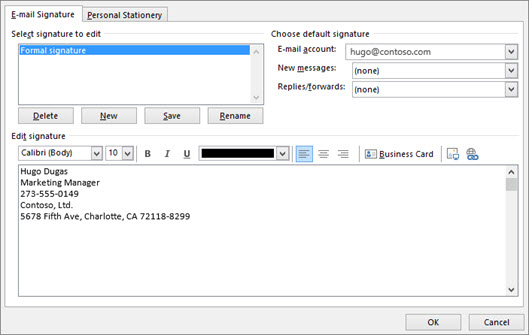Create and add a signature to messages
In Outlook, you can create one or more personalized signatures for your email messages. Your signature can include text, images, your electronic business card, a logo, or even an image of your handwritten signature. You can set up Outlook so that signatures are automatically added to all outgoing messages or create your signature and add it to messages on a case-by-case basis.
Create your signature and choose when Outlook adds a signature to your messages
Important: If you have a Microsoft Office 365 account, and you use Outlook and Outlook on the web or Outlook on the web for business, you need to create a signature in both products. To create and use email signatures in Outlook on the web, see Create and add an email signature in Outlook.com or Outlook on the web.
If you want to see how it's done, go directly to the video below.
-
Open a new email message.
-
Select Signature > Signatures from the Message menu.
Depending on the size of your Outlook window and whether you're composing a new email message or a reply or forward, the Message menu and the Signature button might be in two different locations.


-
Under Select signature to edit, choose New, and in the New Signature dialog box, type a name for the signature.
-
Under Edit signature, compose your signature. You can change fonts, font colors, and sizes, as well as text alignment. If you want to create a more robust signature with bullets, tables, or borders, use Word to format your text, then copy and paste the signature into the Edit signature box.

Notes:
-
You can add links and images to your email signature, change fonts and colors, and justify the text using the mini formatting bar under Edit signature.
-
You can also add social media icons and links in your signature. For more information, see Insert hyperlinks to Facebook and Twitter in your email signature.
-
To add images to your signature, see Add a logo or image to your signature.
-
-
Under Choose default signature, set the following options for your signature:
In the E-mail account drop-down box, choose an email account to associate with the signature. You can have different signatures for each email account.
If you want your signature added to all new messages by default, in the New messages drop-down box, select one of your signatures. If you don't want to automatically add a signature to new messages, choose (none). This doesn't add a signature to any messages you reply to or forward.
If you want your signature to appear in the messages you reply to and forward, in the Replies/forwards drop-down, select one of your signatures. Otherwise, accept the default option of (none).

-
Choose OK to save your new signature and return to your message. Outlook doesn't add your new signature to the message you opened in Step 1, even if you chose to apply the signature to all new messages. You'll have to add the signature manually to this one message. All future messages will have the signature added automatically. To add the signature manually, select Signature from the Message menu and then pick the signature you just created.
Add a logo or image to your signature
If you have a company logo or an image to add to your signature, use the following steps.
-
Open a new message and then select Signature > Signatures.
-
In the Select signature to edit box, choose the signature you want to add a logo or image to.
-
Select the Image icon
 , locate your image file, and select Insert.
, locate your image file, and select Insert. -
To resize your image, right-click the image, then choose Picture. Select the Size tab and use the options to resize your image. To keep the image proportions, make sure to keep the Lock aspect ratio checkbox checked.
-
When you're done, select OK, then select OK again to save the changes to your signature.
Insert a signature manually
If you don't choose to insert a signature for all new messages or replies and forwards, you can still insert a signature manually.
-
In your email message, on the Message tab, select Signature.
-
Choose your signature from the fly-out menu that appears. If you have more than one signature, you can select any of the signatures you've created.
See how it's done

Create a signature
-
Open a new message. On the Message tab, in the Include group, click Signature, and then click Signatures.

-
On the E-mail Signature tab, click New.
-
Type a name for the signature, and then click OK.
-
In the Edit signature box, type the text that you want to include in the signature.
-
To format the text, select the text, and then use the style and formatting buttons to select the options that you want.
-
To add elements besides text, click where you want the element to appear, and then do any of the following:
Options
How to
To add an electronic business card
Click Business Card, and then click a contact in the Filed As list. Then click OK
To add a hyperlink
Click
 Insert Hyperlink, type in the information or browse to a hyperlink, click to select it, and then click OK
Insert Hyperlink, type in the information or browse to a hyperlink, click to select it, and then click OKTo add a picture
Click
 Picture, browse to a picture, click to select it, and then click OK. Common image file formats for pictures include .bmp, .gif, .jpg, and .png.
Picture, browse to a picture, click to select it, and then click OK. Common image file formats for pictures include .bmp, .gif, .jpg, and .png. -
To finish creating the signature, click OK.
Note: The signature that you just created or modified won't appear in the open message; it must be inserted into the message.
Add a signature to messages
Signatures can be added automatically to all outgoing messages, or you can choose which messages include a signature.
Note: Each message can contain only one signature.
Insert a signature automatically
-
On the Message tab, in the Include group, click Signature, and then click Signatures.

-
Under Choose default signature, in the E-mail account list, click an email account with which you want to associate the signature.
-
In the New messages list, select the signature that you want to include.
-
If you want a signature to be included when you reply to or forward messages, in the Replies/forwards list, select the signature. Otherwise, click (none).
Insert a signature manually
-
In a new message, on the Message tab, in the Include group, click Signature, and then click the signature that you want.

Tip: To remove a signature from an open message, select the signature in the message body, and then press DELETE.
See also
Feedback on creating an Outlook signature
Do you have feedback on creating or using Outlook signatures? We'd like to know. In particular, if you had trouble locating the Signatures menu, we'd like to know where you expected to find the option to create a signature. The Outlook programming team and the Outlook documentation team listen to your feedback. Click Yes or No at the bottom of your screen next to Was this information helpful? and leave your comments and suggestions for improving Outlook's signature feature. Please let us know what version of Outlook you're currently using as well as why you searched for help on creating a signature. We'll update this documentation regularly to answer as much of your feedback as we can.
Sigsync Office 365 email signature
ReplyDeleteOffice 365 email signature are used by businesses of all sizes to enhance their brand and marketing programs. Email signature marketing is easy to adapt to achieve a number of sales goals. In addition, this strategy can support content downloads, increase page visits, promote an event, encourage social media engagement and much more.
Email signatures are very effective in leaving a lasting impression on an the audience. Email signature software supports company branding by including the company logo, social media icons, any product links and mobile apps links that gives brand acknowledgement to your organization.
Sigsync is centralized, secure Office 365 email signature software that ensures complete control over your company email signatures. Sigsync provides the best opportunity to brand your business. It helps to design an attractive and professional company-wide email signature on every email across all the email clients and devices.
Few highlights of the email signature service:
● Secured, web-based, easy to configure email signature across all email clients and devices
● Branded email signatures and disclaimers for the entire organization
● Automatically fetches details from Azure AD to add email signature
● Email signature under all reply and forward emails
● Preview of signature during email composing
● Enable signature in sent items
● Centralized management of Office 365 email signature for all the employees
● User-friendly dashboard to choose and customize templates as per the business needs.
● Automatic configuration of Exchange Online
● Provision to effectively advertise for the services by customizing email signature with banners, social media links, brand logo.
For more information on Sigsync Office 365 email signature service, visit https://www.sigsync.com